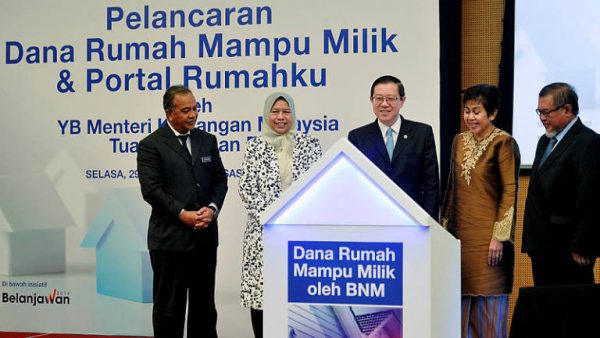Lower monthly mortgage rate under BNM’s RM1 billion housing fund
First-time house buyers are expected to enjoy 23% less in monthly commitment compared to current financing schemes offered in the market with the official launch of Bank Negara Malaysia’s (BNM) RM1 billion Fund for Affordable Homes initiative. With a maximum 3.5% financing rate per annum for houses priced up to RM150,000, the initiative had attracted more than 1,037 individuals who signed up for its financial education requirement under the Credit Counselling and Debt Management Agency (AKPK). Besides addressing the financial needs of first-time house buyers, the initiative also aimed at educating them on their ability to borrow and to pay back. A 2018 study showed that most Malaysians were unable to support unexpected expenses, with 52% admitting difficulties to save RM1,000 during emergency times. (The Sun Daily)
Govt to build 100,000 affordable homes by end-2019
The Housing and Local Government Ministry is targeting to build 100,000 affordable homes by the end of this year, in line with the Pakatan Harapan government’s manifesto to provide budget housing. Housing and Local Government Minister Zuraida Kamaruddin said the homes, which will be made available all over Malaysia, will be capped at RM300,000. The new National Housing Policy has outlined five focuses, 16 strategies and 57 action plans. The five focuses include improving accessibility and affordability; quality housing for all; cohesive neighbourhood; improving coordination between housing development and transportation; and strengthening institutional capability for the National Housing Policy. (The Star Online)
Developers expect glut in property market this year
Developers, concerned with the oversupply of homes in the country, are expecting this year to be worse than 1999, when the Asian Financial Crisis was in full swing. As such, they urge the relevant authorities to take necessary measures to address the issue and alleviate the glut. Former Penang Rehda chairman Datuk Jerry Chan said there was no severe glut back in 1999, and it was easier to buy property then. “However, the number of overhang units now is something which we have never seen before,” he said. In Penang alone, there was about 40% unsold units, involving affordable and luxury categories. Meanwhile, current Redha chairman Datuk Toh Chin Leong said the property glut was mostly in the RM300,000 category. He said many of the buyers could not get loans due to the stringent guidelines, prompting oversupply of such properties. However, there was no unified database on the unsold units in the country. (NST Online)
 Malaysia moves one spot in latest corruption index
Malaysia moves one spot in latest corruption index
Malaysia has moved up to 61st spot among the 180 countries in the latest Corruption Perceptions Index (CPI) for 2018, one notch higher from the previous year. The CPI scores and ranks are based on 13 surveys and expert assessments which measures the perceived level of corruption in the country’s public sector. Malaysia stood below Singapore (3rd) and Brunei (31st), but above Indonesia (89th), Thailand (99th), the Philippines (99th), Vietnam (117th), Myanmar (132nd), Laos (132nd) and Cambodia (161st). Malaysia has launched the National Anti-Corruption Plan (NACP) to step up the war against corruption. Worldwide, Denmark is in the top spot, while New Zealand ranked second. Finland, Singapore, Sweden and Switzerland shared the third spot. the bottom last countries were Sudan, North Korea and Yemen, South Sudan, Syria and Somalia. (NST Online)
Incoming crypto regulations seen as important for industry’s growth
Stakeholders of the Malaysian cryptocurrency space, by and large, welcome the regulations to be introduced by the Securities Commission Malaysia (SC) and Bank Negara Malaysia (BNM), as they view them as important ingredients for the further development of the industry. Malaysia’s move to introduce the regulations is good as it will help build trust in the industry, which will help it mature. The possible implementation of certain standards for whitepapers of initial coin offerings (ICOs) and the imposition of certain investment thresholds for those that would like to participate in ICOs, are generally in line with securities law. The development of the digital assets space in Malaysia can contribute to deeper capital markets. The SC announced a transitional period of up to March 1 for digital asset platforms to continue to operate, where operators are not permitted to accept new investors and will only be allowed to facilitate the withdrawal or transfer of client assets. (The Edge Markets)





